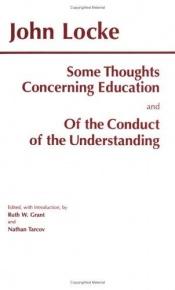Some Thoughts Concerning Education
Blurb
Some Thoughts Concerning Education is a 1693 treatise on the education of gentlemen written by the English philosopher John Locke. For over a century, it was the most important philosophical work on education in England. It was translated into almost all of the major written European languages during the eighteenth century, and nearly every European writer on education after Locke, including Jean-Jacques Rousseau, acknowledged its influence.In his Essay Concerning Human Understanding, Locke outlined a new theory of mind, contending that the gentleman's mind was a tabula rasa or "blank slate"; that is, it did not contain any innate ideas. Some Thoughts Concerning Education explains how to educate that mind using three distinct methods: the development of a healthy body; the formation of a virtuous character; and the choice of an appropriate academic curriculum.
Locke wrote the letters that would eventually become Some Thoughts for an aristocratic friend, but his advice had a broader appeal since his educational principles allowed commoners to think they could acquire the same kind of character as the aristocrats for whom Locke originally intended the work.

 English
English Español
Español Deutsch
Deutsch










Member Reviews Write your own review
Be the first person to review
Log in to comment